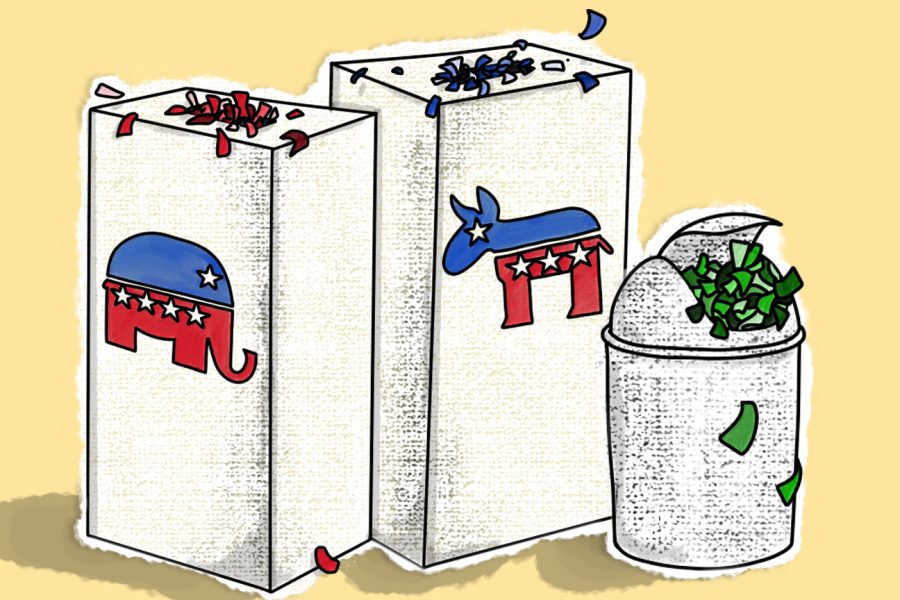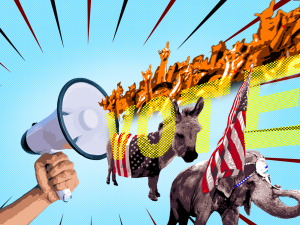POINT: Third-party voting invalidates your vote
October 25, 2022
When Kanye West announced his 2020 presidential campaign via Twitter, he surprised people across the world. Although many credible new sources wrote him off as a noncompetitor to Democratic candidate Joe Biden and Republican candidate Donald Trump, young voters were inclined to support his campaign due to the rapper and songwriter’s fame. While West did not win the presidency, he did receive a staggering 60,000 votes, with over one-sixth of his votes coming from Tennessee.
The amount of votes West received brings into question the legitimacy of voting for third-party candidates in a two-party political system. West’s fans were disappointed in his presidential campaign because it encouraged them to “waste a vote.” Although West’s campaign was an exceptionally unorganized mess, many other independent candidates also received this criticism — regardless of their political views.
As students consider who to vote for during the election season, they should refrain from voting third-party. Unfortunately, third-party candidates have an unlikely chance of winning, and there are unintended consequences of not voting for competitive candidates.
An independent candidate has never won a Texas state election, and very few independents have won the presidential election.
Research shows that young voters are more likely to vote for third-party candidates for many reasons, such as expressing their disdain for both Democratic and Republican candidates or protesting the two-party system as a whole. While voting for an independent candidate may seem like a neutral stance against the dominant two-party system, it actually does the opposite.
For instance, if someone votes for a conservative independent candidate, their lack of a vote for the Republican party will benefit the Democratic party. The best stand someone can take to represent their vote is to support the most viable candidate who aligns with their political ideology.
With the political polarization between the Democratic and Republican parties, Americans are leaning more toward voting for independent candidates as a rejection of the two-party system. However, this rebellion is merely symbolic and provides little benefit.
Daron Shaw, UT distinguished teaching government professor, said America’s bipartisan system makes third-party voting symbolic without causing any real change.
“Because a particular jurisdiction elects only one representative, voting for anyone not in a position to win a plurality of the vote is essentially a symbolic act,” Shaw said in an email. “This creates a psychological incentive to pick from amongst the candidates who actually have a chance to win.”
Many political experts believe America would benefit from a third-party system, partly due to the binary system’s extremist nature that fosters a lot of political division. However, this cannot be solved by a single independent candidate. Political change requires a collective mindset among Americans.
Yosmilie Sibrian, international relations and global studies sophomore, believes that although third-party candidates are unlikely to win, they play an important role in getting people to the voting booths.
“Although a third-party candidate won’t really have a chance of winning, I think that if you don’t agree with either side of the bipartisan candidates and their policies, it’s important for voters to feel included when it comes to having a choice rather than just not voting at all,” Sibrian said.
While Sibrian’s point does acknowledge voters tend to value diversity in candidates, it fails to acknowledge that the policies of third-party candidates tend to live and die throughout their campaigns. This often occurs due to a lack of media attention, the structure of the electoral college system and the extensive amount of money it takes to maintain political activism.
Students should generally be wary of voting for third-party candidates because of their lack of political representation in presidential and state elections. These votes are simply symbolic, and make no real change because of the lack of collective action.
DuBois is a public relations and sociology sophomore from Killeen, Texas.















